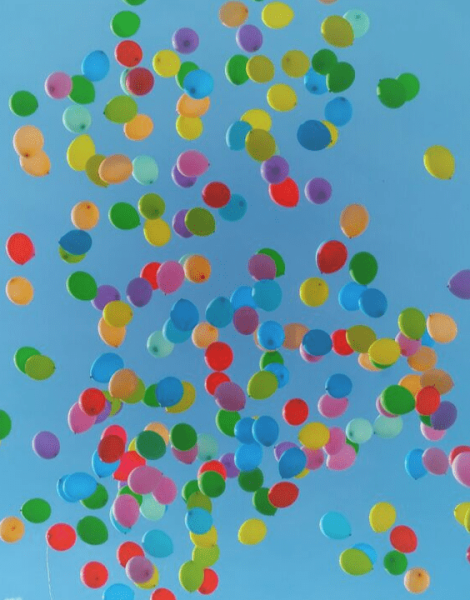We turned down our street and I heard my three year old open her window. I cringed, because I knew 0.25 seconds after it happened, her balloon would get sucked right out. Sure enough, there was the scream I’d anticipated. “Mooooooooom, my ballooooooon!” When we got home, I had her take a few deep breaths and reminded her that it had gone to be with her Papa in heaven. This is not the first time we’ve lost a balloon into the sky, and her impressive young brain remembers the color of every balloon that has ever been lost. We imagined them all in a bunch with her very special grandpa that she never met, laughing with joy.
We are no strangers to talking about loss and death in our house.
My dad passed away right before I got pregnant, and I had promised myself that my daughter would know him. Not in person, but she would know him. Before she was born I did everything I could to learn about ways to incorporate his memory into our lives. There’s a picture of him in her room, she has a bear made of his shirt, and we go out to his favorite restaurant on his birthday. If an opportunity comes up to talk about him, I accept it. It’s been wonderful, very gradual way to teach my child about death without it being an abrupt thing.
But what do you do when there is a death that directly impacts your child? A person or a pet that is physically part of their life? A few weeks ago I got a text from our daycare provider letting me know that she was having to put her dog Rocky to sleep. I spent the rest of the day googling ways to discuss this huge change with my daughter.
Rocky has been part of my daughter’s life since she started there at eight weeks old, so she doesn’t know Ms. Judy’s house without him. I got to pickup that evening with an armory of ways to talk about the change that was about to happen. So many worries circled around in my brain. Did she actually understand the heaven we had talked about over the past few years? Is seeing someone actually disappear out of her life going to make the death of her Papa a traumatic thing? She got in the car with as much pep and sass in her step as usual.
Before I had a chance to say anything she informed me that Rocky was leaving to be with Papa and the balloons. “Can you believe how much fun they are going to have Mom? Rocky was old, and he’s going to feel so much better in heaven.”
Talking to your kids about death doesn’t need to be a scary thing. Plus, forcing ourselves to process in a positive way can be beneficial to us also. Bringing up the concept of it before there’s a significant loss in their life is important. The more opportunities to discuss than you can imagine. Have a conversation about a dead plant, or even the shriveled up bug you find in the corner of the windowsill. These are all fantastic ways to bring up the concept of lifecycle and death early on.
Make sure to listen, and give an honest response. Allow for yourself and your child to have emotions. It’s ok for them to be sad, angry or any other range of feelings.
I still cry when we talk about my dad sometimes, and it helps her know that even grownups get sad with loss.
Whatever way you decide to discuss death, make sure you have a plan and be consistent. Have a heaven or don’t. Does everyone go to the same one or do they get their own? And last but not least, give your child some credit. They are capable of processing so much more than we give them credit for. Don’t be afraid of having these tough conversations with them. Having a healthy understanding of death will help them realize that death isn’t the end of our journey, it’s simply a part of it. All the memories we have keep people alive in our hearts long after they are no longer with us physically.








